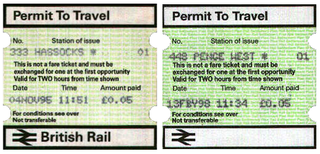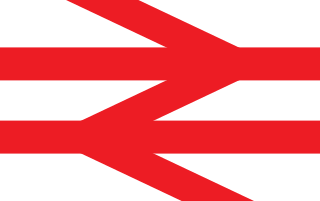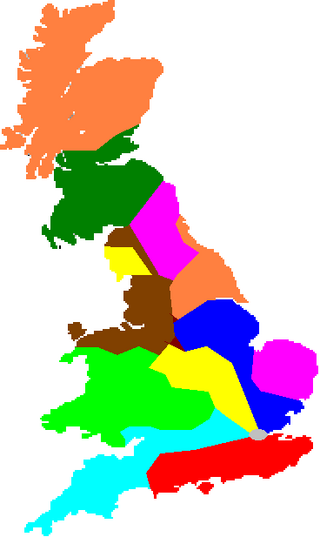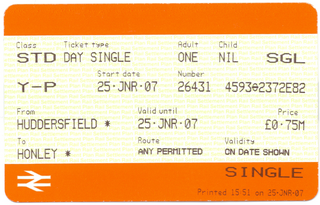Related Research Articles

The railway system in Great Britain is the oldest railway system in the world. The first locomotive-hauled public railway opened in 1825, which was followed by an era of rapid expansion. Most of the track is managed by Network Rail, which in 2017 had a network of 15,811 kilometres (9,824 mi) of standard-gauge lines, of which 5,374 kilometres (3,339 mi) were electrified. These lines range from single to quadruple track or more. In addition, some cities have separate metro, light rail and tram systems. There are also many private railways, which are primarily short lines for tourists. The main rail network is connected with that of continental Europe by the Channel Tunnel and High Speed 1, which fully opened in 1994 and 2007 respectively.
National Rail (NR) is the trading name licensed for use by the Rail Delivery Group, an unincorporated association whose membership consists of the passenger train operating companies (TOCs) of England, Scotland, and Wales. The TOCs run the passenger services previously provided by the British Railways Board, from 1965 using the brand name British Rail. Northern Ireland, which is bordered by the Republic of Ireland, has a different system. National Rail services share a ticketing structure and inter-availability that generally do not extend to services which were not part of British Rail.

The Deutsche Bahn AG is the national railway company of Germany. Headquartered in the Bahntower in Berlin, it is a joint-stock company (AG). The Federal Republic of Germany is its single shareholder.
The Rail Delivery Group (RDG), previously the Association of Train Operating Companies, is the British rail industry membership body that brings together passenger and freight rail companies, Network Rail and High Speed 2.

A conductor or guard is a train crew member responsible for operational and safety duties that do not involve actual operation of the train/locomotive. The conductor title is most common in North American railway operations, but the role is common worldwide under various job titles. In Commonwealth English, a conductor is also known as guard or train manager.

In the ticketing system of the British rail network, a Permit to Travel provisionally allows passengers to travel on a train when they have not purchased a ticket in advance and the ticket office of the station they are travelling from is closed, without incurring a penalty fare.

The United Kingdom consists of Great Britain and Northern Ireland, and previously consisted of Great Britain and the whole of Ireland. Rail transport systems developed independently on the two island masses of Great Britain and Ireland, and most of the railway construction in the Republic of Ireland was undertaken before the creation of the Irish Free State in 1922. Thus, the logical division to discuss the history and present-day state of railways in these areas is by geographical division, rather than the nationalist division of nation states.
A train operating company (TOC) is a business operating passenger trains on the railway system of Great Britain under the collective National Rail brand. TOCs have existed since the privatisation of the network under the Railways Act 1993.

Rail Settlement Plan (RSP) is a division of the Rail Delivery Group in the United Kingdom. It provides a wide range of common services to the UK's train operating companies and third-party providers of information and retail services.

The National Location Code (NLC) is a four-digit number allocated to every railway station and ticket issuing point in Great Britain for use with the ticketing system on the British railway network. They are used in the issue of tickets and for accounting purposes. They are a subset of the NLCs created by British Rail, which are based on four "main" digits plus two supplementary digits.

The Shere SMART is a desktop-based railway ticket issuing system, developed by the Guildford-based company Shere Ltd, utilising Newbury Data ND4020 ticket printer, first introduced in Britain in 2003. Since the first trial installation of the system in the ticket office at London Bridge station, approximately 300 terminals have been installed at stations on the Southern and former Thameslink networks.
There is no single 'discount railcard' available on the UK railway network. In addition to the large number and variety of short-term or localised promotional fares that have been available to passengers on the British railway network in recent decades, there are many permanent concessionary fare schemes available to passengers. Some of these take the form of Railcards, which can be purchased by people who qualify according to the conditions, and which give discounts for all journeys over a period; other concessions are available for individual journeys. In all cases, details of the type of concession will be printed on the passenger's travel ticket, to distinguish reduced-rate tickets from those sold at the standard full fare.

The Ascom EasyTicket is a railway ticket issuing system used in Britain, consisting of a series of self-service (passenger-operated) machines at railway stations. Having been introduced in 2003 on a trial basis by several Train Operating Companies (TOCs) at various stations, the system did not spread into common usage, and most machines have since been removed.

The Atos Worldline FASTticket system is a passenger-operated, self-service railway ticket issuing system, developed by the Guildford-based company Shere Ltd and first introduced on a trial basis in Britain in 1996, shortly after privatisation. It has been developed and upgraded consistently since then, and is now used by seven Train Operating Companies (TOCs) as their primary self-service ticket issuing system. Other TOCs have FASTticket machines at some of their stations, sometimes supplementing other systems.
The Scheidt & Bachmann Ticket XPress system is a passenger-operated self-service railway ticket issuing system developed and manufactured by the German systems development and production group Scheidt & Bachmann GmbH, based in the city of Mönchengladbach. Since the first trial installations in 2003, seven train operating companies (TOCs) in Great Britain have adopted the system as their main passenger-operated ticket vending method, while four others have installed machines at certain stations on their networks. More than 1,500 machines are in place across the country, and more than 850 stations have one or more. Machines can accept cash and/or payment cards and can sell most National Rail tickets.

Avantix Mobile ("AVB") is a portable railway ticket issuing system used across the British railway network from 2001 to 2017.
The National Rail Conditions of Travel (NRCoT) is a contractual document setting out the consumer's rights and responsibilities when travelling on the National Rail railway network in Great Britain. These replaced the National Rail Conditions of Carriage (NRCoC) as of 1 October 2016.

Passenger rail franchising in Great Britain is the system of contracting the operation of the passenger services on the railways of Great Britain to private companies, which has been in effect since 1996 and was greatly altered in 2020, with rail franchising being effectively abolished in May 2021.
A penalty fare, standard fare, or fixed penalty notice is a special, usually higher, fare charged because a passenger using public transport did not comply with the normal ticket purchasing rules. It should not be confused with an unpaid fares notice.
Tribute is one of the older generations of ticket issuing systems introduced to ticket offices by British Rail during the mid-1990s, prior to the privatisation of the network. PC-based, it is one of several systems trialled with the aim of replacing the aging APTIS system. The original systems was developed by British Rail Business Systems, and was first installed at London St Pancras on 21 January 1994. By April 2005, around 250 terminals were in use Following privatisation, development and support was provided to the train operating companies (TOCs) by SchlumbergerSema, until they were bought by Atos in 2004.
References
- ↑ Brignall, Miles (27 May 2006). "The train fares that are so unfair". The Guardian.
- ↑ "Meerkats, Mere Cats Or Orcats?". Public Transport Experience. 20 October 2012. Retrieved 6 March 2018.